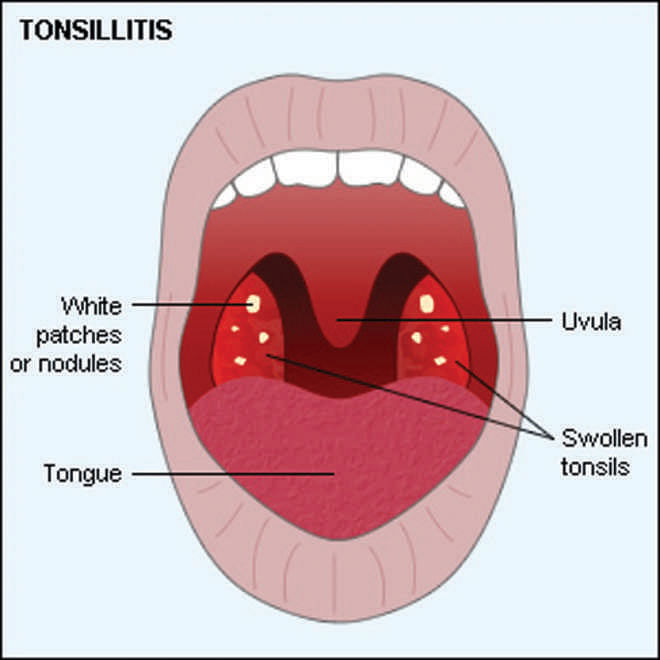Treating Tonsillitis

Do you often face difficulty swallowing or do you wake up every morning with a sore throat and muffled voice? If you do, maybe your two oval-shaped pads of tissue at the back of the throat are responsible to make you suffer. They are called tonsils, an important part of our immune system. Overwhelmed by bacteria or viruses, they swell and become inflamed, a condition known as tonsillitis. In nearly all cases, a tonsillitis or sore throat clears away without leaving any problems.
Most cases of tonsillitis are caused by infection with a common virus, but bacterial infections also may cause tonsillitis.
The tonsils are the immune system's first line of defense against bacteria and viruses that enter your mouth. This function may make the tonsils particularly vulnerable to infection and inflammation. However, the tonsil's immune system function declines after puberty — a factor that may account for the rare cases of tonsillitis in adults.
Symptoms
! Red, swollen tonsils
! White or yellow coating or patches on the tonsils
! Sore throat
! Difficult or painful swallowing
! Fever
! Enlarged, tender glands (lymph nodes) in the neck
! A scratchy, or throaty voice
! Bad breath
! Stiff neck
! Headache
! In children, symptoms may also include:
! Nausea
! Vomiting
! Abdominal pain
At-home care
Because appropriate treatment for tonsillitis depends on the cause, it's important to get a prompt and accurate diagnosis. If a virus is the expected cause of tonsillitis, these strategies are the only treatment. Your doctor won't prescribe antibiotics. Your child will likely be better within seven to 10 days.
! Make sure that your child gets plenty of sleep and rest his or her voice.
! Give your child adequate fluids. to keep the throat moist and prevent dehydration.
! Cold treats like ice pops can soothe a sore throat.
! Warm liquids — broth, caffeine-free tea or warm water with honey are also some comforting foods for Tonsillitis.
! Have your child gargle a salt water solution and then spit it out.
! Offer lozenges. Children older than age 4 can suck on lozenges containing benzocaine or other anesthetics to relieve a sore throat.
! Avoid irritants. Keep your home free from cigarette smoke and cleaning products that can irritate the throat.
Surgery
Tonsils are an important part of the immune system throughout life, so it is best to avoid removing them. Surgery to remove tonsils (tonsillectomy) may be used to treat frequently recurring tonsillitis, chronic tonsillitis or bacterial tonsillitis that doesn't respond to antibiotic treatment.
Tips to remember
! Surgery to remove tonsils, once a common procedure to treat tonsillitis, is usually performed only when tonsillitis occurs frequently, doesn't respond to other treatments or causes serious complications.
! Tonsillitis most commonly affects children between preschool ages and the mid-teenage year
! If you find your children having difficulty breathing and unbearable pain swallowing, get immediate care without any further delay.
! Your child must take the full course of antibiotics as prescribed even if the symptoms go away completely. Failure to take all of the medication as directed may result in the infection worsening or spreading to other parts of the body. Not completing the full course of antibiotics can, in particular, increase your child's risk of rheumatic fever and serious kidney inflammation
Source: Mayo Clinic

 For all latest news, follow The Daily Star's Google News channel.
For all latest news, follow The Daily Star's Google News channel. 



Comments